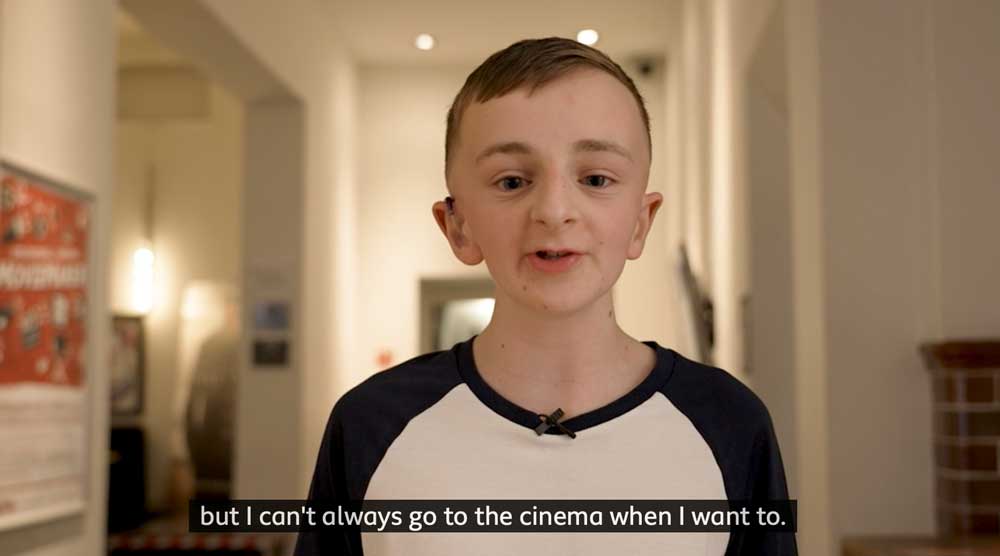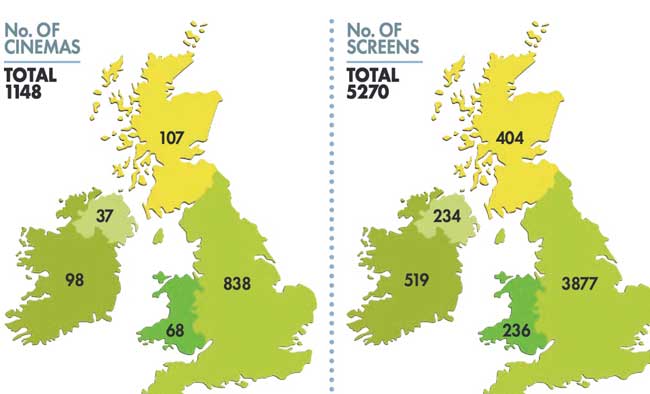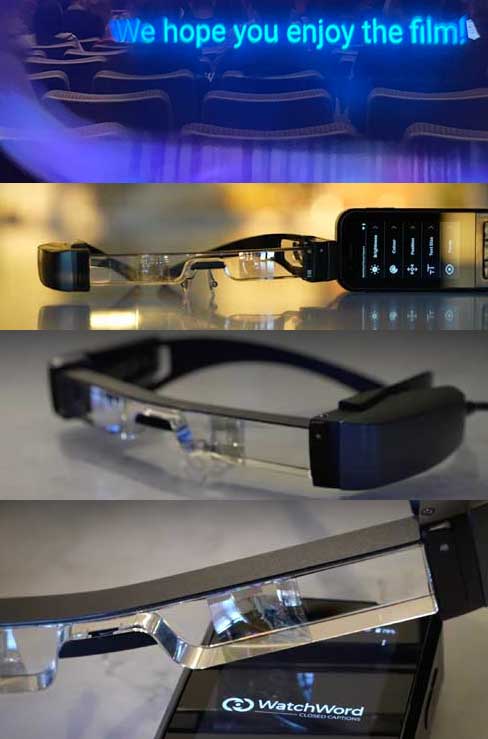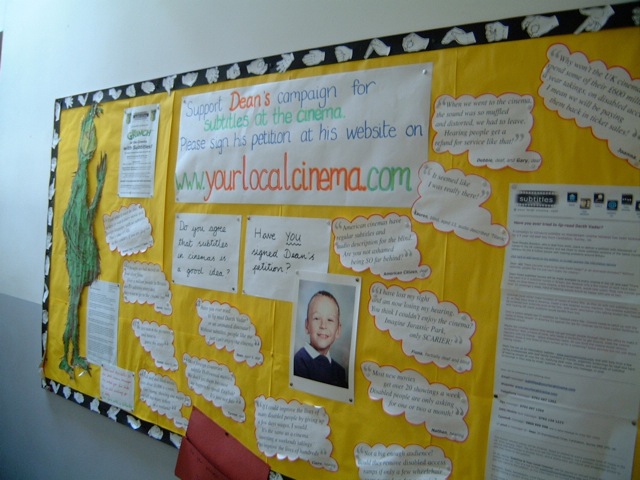UK subtitled/captioned cinema - How it all works...
News blog by: Dean, Manager, YourLocalCinema (and profoundly deaf film fan).
![]() NOTE: Caption tracks are subtitle tracks with extra 'sound' information such as 'phone rings', 'footsteps approaching' etc. When people with hearing loss talk about 'subtitles' we're often referring to captions!
NOTE: Caption tracks are subtitle tracks with extra 'sound' information such as 'phone rings', 'footsteps approaching' etc. When people with hearing loss talk about 'subtitles' we're often referring to captions!
Why can't film fans with hearing loss attend cinemas whenever they want to?
The lack of convenient and sociable opportunities to attend accessible captioned screenings is the main reason why many film fans with hearing loss are unable to attend cinemas.
All popular cinema releases include a subtitle/caption track. All cinemas can welcome film fans with hearing loss by scheduling screenings of these films with the track switched ON. All cinemas CAN provide opportunities to attend accessible subtitled/captioned screenings.
Cinemas prefer to SCHEDULE captioned screenings a week or more in advance, so everyone knows a particular show is captioned. Cinemas prefer NOT to provide captions ‘on demand’ because that show will have been advertised as NOT captioned, and people may have already booked tickets to see it WITHOUT captions.
Each year YourLocalCinema promotes around 100,000 accessible, English-language captioned screenings. More than 400 different films annually. The vast majority of cinemas in the UK and Ireland (more than 950) provide these screenings. In 2024, English-language captioned screenings attracted an estimated 1.8 million attendees.
In addition, around 300,000 foreign-language subtitled screenings are also promoted. While these are not entirely accessible, lacking non-dialogue audio, they are still enjoyed by many film fans with hearing loss.
Currently, around 1% of UK English-language cinema screenings are captioned. Most cinemas cinema provide between one and four captioned screenings per week. The majority are provided mid-week, many during the daytime - inconvenient, unsociable times when most people are at work or school. The most popular times for going to the cinema are weekend evenings. There are usually less than 50 Fri/Sat evening CAPTIONED screenings each week, across the whole of the UK/Ireland. Many people who would like to watch films at the cinema are unable to do so.
A recent RNID/BFI report stated that 97% of people with hearing loss said they would attend cinema regularly if a nearby cinema had captioned shows at convenient times.
The BBC's 'Rip Off Britain' TV/web show (May 2022, clips HERE and HERE ) found that in a typical week, out of around 3,000 screenings, Odeon, Cineworld and Vue provided around 30 captioned screenings between them. That's around 1% of screenings. (Less than 1% were screened Fri or Sat evenings - the most popular cinema-going periods).
On UK cinema's 2022 'National Cinema Day', where all tickets were £3, out of more than 20,000 screenings, only 22 English-language screenings were captioned.
In 2022 Cineworld opened a new cinema in Hounslow, London. In the first two weeks, it had around 200 foreign-language subtitled screenings, but only TWO English-language captioned screenings.
Latest news: Subtitle glasses!
WatchWord subtitle/caption glasses are now available for cinemas to purchase or rent.
Installed in:
Birmingham Mockingbird Cinema
Cumbria, Alhambra cinema, Keswick
Derby QUAD cinema
Edinburgh Fraser Center, Tranet
Essex Saffron Screen, Saffron Walden
Kent, Kavanagh cinema, Herne Bay
Lincolnshire Kinema in the Woods, Woodhall Spa
Lincolnshire Stamford Arts Centre
Suffolk Leiston Cinema, Leiston
Details HERE: https://www.watchword.cc
WHO ATTENDS ENGLISH-LANGUAGE subtitled/captioned screenings?
Feedback indicates that many people that attend captioned/subtitled screenings DON'T have hearing loss. Many are friends/families of the person with hearing loss in attendance. 90% of deaf children don't have deaf parents. Much of today’s generation are NOT bothered by words on a screen. Recent research indicates that more people have the sound off - and captions on - when watching social media clips on their phones. People are used to subtitles on Netflix, YouTube, gyms, pubs etc. Foreign-language films and TV screenings are very popular. Subtitles/captions are quite the norm nowadays.
A recent YouGov poll on same-language subtitles found that most 18-24 year olds, and almost a third of 25-49 year olds, watch TV with the subtitles ON.
https://twitter.com/YouGov/status/1629141495696457729
A recent Twitter UK poll on subtitles by Martin Lewis, with more than 70,000 votes, found that almost 80% of people prefer subtitles over dubbing on films.
https://twitter.com/MartinSLewis/status/1614903044855963650
A recent poll on subtitles by popular news site Vox, with more than 5 million views, found that 57% regularly use subtitles/captions on TV or streaming films. Only 2% of respondents said they had hearing loss.
https://www.youtube.com/watch?v=VYJtb2YXae8
Netflix recently revealed that 40% of its global users have subtitles switched ON, all the time, while 80% switch them on at least once a month.
https://www.theweek.co.uk/news/955356/why-have-we-all-switched-on-the-subtitles
![]() According to the Film Distributors' Association: "Foreign language films ... was the only box office growth area for cinemas in 2020. Clearly UK audiences desire ever more on-screen diversity."
According to the Film Distributors' Association: "Foreign language films ... was the only box office growth area for cinemas in 2020. Clearly UK audiences desire ever more on-screen diversity."
In 2020 the Korean-language, English-subtitled film PARASITE won best film and director at the Oscars. Many UK cinemas provided hundreds of convenient opportunities to watch it, including Fri/Sat evenings, and reported very good attendance - many screenings were sold out.
![]() Cineworld said: ['Parasite'] "A remarkable success story that dismantles any notion of subtitles being a barrier'"
Cineworld said: ['Parasite'] "A remarkable success story that dismantles any notion of subtitles being a barrier'"
The Korean-language show "Squid Game" was recently one of the most popular TV showings. Millions of viewers watched it with subtitles.
In 2023 the German-language, English-subtitled film All Quiet On The Western Front won Best film and director at the Baftas. Many screenings were sold out. At the 2023 Oscars, 'Everything Everywhere All At Once' won Best Picture. Much of the film is non-English, and subtitled. One of the biggest films in 2022/23 was 'Avatar The Way Of Water'. Much of it is alien-language, and subtitled.
According to the UK Independent Cinema Office 2022-23 Report: "a long-standing cinema-industry unfounded rumour has it that subtitles restrict audiences. But in 2022, even in the context of reduced audiences for cinemas overall, there were a higher than usual number of subtitled films that surpassed £1 million at the UK box office. All were primarily aimed at younger audiences (broadly, 15–30). This indicates that younger audiences don’t see subtitles as a barrier to enjoying a film"
A recent YouGov report asked 3600+ UK adults: "When watching TV shows or movies in your native language, do you generally prefer to have the subtitles [captions] on or off?" More than 60% of 18-24 year olds said that they prefer to have them ON.
In 2023 the BBC 'Newsround' TV/web show sent Dan, a 13-year-old deaf film fan, to report on cinema access. He investigated the superhero film 'Black Adam'. Of the three big cinemas in Cardiff, Vue had 30 screenings, 1 was subtitled. Of Cineworld's 64 screenings, two were subtitled. Odeon had 76 screenings, two were subtitled (neither of which were at the weekend). BBC video report HERE
![]()
2022 release 'Avatar: The Way of Water' had more than 1,000 subtitled screenings across 400 UK cinemas during its first week of release. 46 different cinema companies provided screenings. However, only four were provided over the Fri/Sat evenings, which is less than half a percent of all captioned screenings.
CODA, the 2022 Oscars Best Picture winner, was about a deaf family. Many deaf people would have liked to have seen it at a cinema. The film was very accessible to deaf people - ALL screenings were captioned. But more than 90% of UK cinemas, including major chains such as Odeon, Vue, and Cineworld, did NOT show the film, denying film fans with hearing loss the opportunity to see it. Among the cinemas that did show the film, many only provided inconvenient and unsociable daytime screenings.
2020 alien thriller A Quiet Place was of particular interest to film fans with hearing loss, as it featured a deaf girl in the lead role. In its opening week, it had 365 captioned screenings in 277 cinemas. 23 different cinema companies screened it. Approximately one third of UK cinemas showed the film with captions in the opening week, but most of them only provided one screening - one opportunity for a person with hearing loss to enjoy the film. About half of the captioned screenings were before 6pm, when many people who have jobs or go to school are unable to attend. There were only THREE captioned screenings on Friday or Saturday evenings, which are the most popular times for going to the cinema. That's less than 1% of the total number of captioned screenings.
In 2021, the film Eternals was of particular interest to many deaf people because it featured the first deaf superhero. In its first week, only about half of the 572 UK cinemas that showed the film provided captioned screenings. Those that did offer captioned screenings provided only one or two showings. Around were inconvenient daytime screenings when many people have work or education commitments. There were NO captioned screenings on Friday or Saturday evenings, which are the most popular and sociable times for going to the cinema. (News article HERE).
Below is a report with 84,000 views on captioned/subtitled cinema from Jessica Kellgren-Fozard, a popular deaf YouTube blogger from Brighton with more than a million followers.
Guardian News report on subtitled/captioned cinema HERE
NDCS report HERE
Metro News report HERE
iNews report HERE
Den of Geek report HERE
And check out this site with useful links and a video highlighting the views of influential deaf people that was shown to cinema industry leaders, in the hope it would change their view on subtitles. Progress update HERE
Could cinemas provide more opportunities to attend subtitled/captioned screenings?
Yes. In May 2022, cinemas DOUBLED the number of screenings FOR ONE WEEK. There were FIVE TIMES as many convenient, sociable Fri/Sat evening screenings - over 100 screenings (compared to less than 20 the previous week). Many cinemas that had never provided an accessible, captioned screening did so for the first (and last) time. This demonstrated that cinemas ARE capable of doing better in this area of access.
Deaf Awareness Week (Sat 2nd May to Fri 8th May 2022): 3,428 screenings UK/IRE nationwide / 30 different films / 635 cinemas provided at least one captioned show / 110 Fri or Sat evening screenings (6pm onwards).
Cinemas decide which films to screen with subtitles, and when to screen them. For cinemas that belong to a chain (Vue, Cineworld, Odeon etc), head office will usually (but not always) determine the frequency and timings of any 'subtitled' schedules.
Some cinemas provide captioning on all films, all screenings, one day a week, making all screenings accessible to film fans with or without hearing loss.
For example, the Moviehouse Coleraine in Northern Ireland usually provides a choice of 5 or more films captioned, with around 20 screenings, every Monday. Since Feb 2022, it has ensured that every Monday, all screenings, all films, all screens have been captioned. The cinema provides a choice of 5 or more films captioned, with around 20 screenings, every Monday. That's more than 1,000 captioned screenings annually. It said that ‘whilst there will always be the occasional complainer, people have now got to used to and accept the Monday captioned screenings’, and that it ‘does not believe it lost a significant amount of sales to justify removing them’. Each week 300+ tickets are issued for Moviehouse Coleraine captioned screenings. That's 15,000+ tickets, worth £100,000+ annually.
Many cinemas have found that when captioned screenings become a regular thing, word spreads, and after a while there’s usually little or no issues with the general public. Captions/subtitles become just another ‘access’ thing that people put up with, like wheelchair spaces and ramps, disabled toilet facilities, parking bays etc - features that help to better-welcome disabled people in the community.
The Depot in Sussex has three screens and aims to ensure that all its screenings on Mondays are subtitled or captioned. It said: "... caption Mondays are popular as have been films such as Parasite (2019) through to All Quiet on the Western Front (2022) which are subtitled" and "attendance is about the same for 'subtitled Monday' as it is the following day (for regular screenings of the same films), with some sold-out screenings"
The Showroom in Sheffield also runs "captioned Mondays," and has found that people "generally do not complain when they realize that a Monday show they are attending is subtitled or captioned"
The Broadway cinema in Nottingham has dozens of captioned screenings each week.
The Quad in Derby runs many captioned screenings each week and has found that they do not result in lost sales. They have stated that their "hearing customers will go to one of the many other film screenings if they do not want to watch one with captions"
In addition to providing more on-screen captioned/subtitled screenings, cinemas could provide many, many more on-screen captioned/subtitled screenings by purchasing SUBTITLE GLASSES, which, in theory, enable ALL* regular screenings to also be captioned/subtitled - only the person wearing the glasses sees the captions/subtitles!
*If film distributors produce and provide cinemas with compatible 'caption' tracks for each film - most popular films are compatible.
News: Subtitle Glasses at UK cinemas!
Do cinemas screen many non-English subtitled films?
Yes! There are over 800 cinemas in the UK and Ireland, with more than 4,000 screens, and most of them provide regular subtitled screenings. Each week, there are thousands of subtitled screenings available around the UK and Ireland - French, Polish, Indian, Chinese, Korean, Russian, and others. Hundreds are screened on Friday and Saturday evenings, which are the most popular times for going to the cinema.
What's the law regarding cinema access?
The UK’s Equality and Disability Acts require cinemas to provide ‘reasonable adjustments’ to enable people with hearing loss to attend. It states as an example: 'A cinema chain ensures that captioned performances of films are shown in all its branches'
Details HERE
![]() In 2022, the UK cinema industry’s association (UKCA) said: "While there remain some financial challenges around programming more of these screenings, cinemas remain fully committed to improving provision where possible"
In 2022, the UK cinema industry’s association (UKCA) said: "While there remain some financial challenges around programming more of these screenings, cinemas remain fully committed to improving provision where possible"
In the US, a law came into effect in New York City in May 2022 that requires cinemas to offer captions on the screen for up to four showtimes per movie each week, including during the most popular cinema-going times, such as Friday nights and weekends. This is intended to make cinemas more accessible for individuals with hearing loss. The Mayor said "In addition to moviegoers who are D/deaf and hard of hearing, captions benefit almost everyone, especially people watching movies in their non-native language, and children and adults learning to read."
Does it cost a cinema to welcome film fans with hearing loss?
No. Film companies bear the cost of producing caption tracks for their films, and almost all films include subtitle or caption tracks. These tracks are usually made available to cinemas in time for the film's release date and are also required by and eventually made available to the home entertainment market, including TV, streaming, and disc.
![]() For cinemas, providing a captioned showing of a popular film is unlikely to result in a "lost sale," as captioned screenings do not deter people from seeing a film they want to watch. Instead, people who are put off by captions simply attend one of the many other regular, non-captioned screenings, which are often available in many cinemas within reach, all day, every day, for a month or more. As a result, offering captioned screenings does not have a negative impact on ticket sales.
For cinemas, providing a captioned showing of a popular film is unlikely to result in a "lost sale," as captioned screenings do not deter people from seeing a film they want to watch. Instead, people who are put off by captions simply attend one of the many other regular, non-captioned screenings, which are often available in many cinemas within reach, all day, every day, for a month or more. As a result, offering captioned screenings does not have a negative impact on ticket sales.
By providing peak-time captioned screenings, cinemas don't LOSE money, they just don't make AS MUCH money as they could - FOR THAT PARTICULAR SHOW.
While a one or two-screen cinema may not be able to offer as many captioned screenings of each film as a large multiplex, it is expected that at least one opportunity to attend an accessible, inclusive screening should be made available each week to accommodate film fans with hearing loss.
Cinemas don't expect to profit from providing 'access' facilities such as disabled toilets, ramps, wheelchair spaces, parking spaces, autism-friendly showings, dementia-friendly showings, and captioned screenings. These facilities are provided to better-welcome people in the community that need assistance to fully enjoy their film-going experience.
![]() To welcome customers in wheelchairs, cinemas typically ensure that there is at least one or two spaces available for wheelchairs. These spaces are not necessarily expected to be filled frequently, because there may not be enough wheelchair users in the area to make these spaces profitable, and the spaces provided are often in uncomfortable viewing positions, such as at the very front or the very back of the theater.
To welcome customers in wheelchairs, cinemas typically ensure that there is at least one or two spaces available for wheelchairs. These spaces are not necessarily expected to be filled frequently, because there may not be enough wheelchair users in the area to make these spaces profitable, and the spaces provided are often in uncomfortable viewing positions, such as at the very front or the very back of the theater.
In theory, a cinema could potentially make more money by filling the wheelchair spaces with regular seats, as a few more ticket buyers might attend. However, the reality is that most cinemas do not fill all of their seats each week, and many fill less than 50% overall, with many seats remaining empty, particularly during the week. As a result, whether or not a cinema's wheelchair spaces are filled each day does not have an impact on its weekly box office profits.
However, a wheelchair space can make a big difference to a film fan in a wheelchair, as it enables them to attend the cinema and be included in society. Therefore, cinemas should always offer spaces for wheelchairs, ideally located in comfortable viewing areas.
Similarly, welcoming customers with autism, dementia, or hearing loss by providing accessible, captioned, or autism-friendly showings (which may have lower attendance than regular showings due to the smaller number of individuals with these conditions compared to those without) will not make a significant difference to a cinema's box office profits, because many seats are empty each week anyway.
However, these showings can make a big difference to customers who require some assistance to enjoy a film, as they provide the opportunity to attend and be included in society. Therefore, cinemas should always offer accessible showings, ideally at convenient and sociable times that are more likely to be attended, such as outside of normal working and school hours. This can help to ensure that individuals with disabilities have the opportunity to enjoy films and be included in the community.
It can be done. Cinemas with many screens and many screening times COULD offer captioned screenings on all films, all showings, ONE DAY EACH WEEK, making all showings on that day inclusive and accessible to film fans with or without hearing loss. Some cinemas, such as the ones mentioned earlier, have successfully implemented this approach and have found that many people who attend captioned screenings do not have hearing loss, but are simply not bothered by the presence of captions on the screen.
Captioned screenings provide an inclusive and accessible option for film fans with hearing loss, and they can also be enjoyed by individuals without hearing loss. By offering captioned showings, cinemas can welcome a wider range of customers and help to create a more inclusive and accessible environment for all.
It is expected that English-language subtitled or captioned screenings (as well as foreign-language captioned screenings) will not be very well-attended, particularly during off-peak times, because most people prefer not to see captions on the cinema screen (although many people over the age of 40 may benefit from them). There are fewer people with hearing loss in a cinema's catchment area compared to those with normal hearing, and it is unlikely that they will all attend together for a particular film, day, and time chosen by the cinema.
In July 2023, thanks mainly to Barbie, many UK cinema companies, including Cineworld, Picturehouse, Vue and Curzon had some of their busiest, best-ever, most money-making weekends. (Curzon's previous best week was for Parasite, a subtitled foreign-language film). 500 dogs saw Barbie in it's first week, at Picturehouse dog-friendly screenings. Newcastle’s Tyneside Cinema had the biggest weekend in its 86-year history. London's Genesis Cinema, and Dublin and Galway Light House cinemas, had their biggest week ever. Many cinemas ran out of popcorn.
WHAT CAN FILM FANS WITH HEARING LOSS DO TO IMPROVE THINGS?
If people are not satisfied with a company's service, they can take steps to improve the situation by letting the company know about their concerns. One way to do this is to contact cinemas they'd like to attend and request that they provide accessible, captioned screenings of popular films at convenient days and times that are suitable for people to attend. Ask the cinemas to do their best to provide an equal service and to welcome customers with hearing loss - to help people to spend money, buy tickets and snacks, and enjoy the cinema experience with family and friends.
A person could consider contacting organisations such as the National Deaf Children's Society (NDCS) and the Royal National Institute for Deaf People (RNID), which are charities that work to improve things for people with hearing loss. These organisations may be able to provide additional resources or support to help people advocate for better accessibility at cinemas.
A person could contact local cinemas and request that cinemas provide many, many more captioned/subtitled screenings by purchasing SUBTITLE GLASSES, which, in theory, enable ALL* regular screenings to also be captioned/subtitled - only the person wearing the glasses sees the captions/subtitles!
HOW CAN I FIND OUT WHAT'S SUBTITLED/CAPTIONED IN MY AREA?
The YourLocalCinema website makes it quick & easy for people with hearing loss to find English-language subtitled/captioned screenings in their locality. Simply click this link to automatically find screenings around your location. Save that page link to your phone's home screen (or browser's bookmarks), then check it often for the latest screenings.
To make it even easier to find what’s captioned in cinemas near you, let us know the cinemas/areas you’d like listed and we’ll create a personal page, just for you. Save the link, check it often for the latest screenings.
Email: subtitles@yourlocalcinema.com
Get TWITTER updates. And subscribe for free to the weekly email newsletter.
In 2024, YourLocalCinema promoted 80,000+ captioned English-language screenings of 400+ films, across 600+ UK / Ireland cinemas.
WHY ARE ACCESSIBLE, INCLUSIVE CINEMA SCREENINGS IMPORTANT?
![]()
For film fans with hearing loss, accessible, captioned screenings remove the disabling barrier, for a few hours at least, achieving greater inclusion and community integration
Accessible, subtitled/captioned cinema screenings have made a positive, cultural, long-term impact on society. They benefit people of all ages. Each year in the UK, hundreds of children are born with significant hearing loss (NDCS). It's estimated that more than ten million, including thousands of young people, have hearing loss (RNID). Our society is ageing, and with ageing, loss of some hearing is inevitable. Access to film - via subtitles/captions - is something that we may all appreciate, eventually.
Only a few decades ago, the only way for people with hearing loss to enjoy the cinema was to watch a foreign-language film. However, thanks to the collaborative efforts of the UK film industry, organizations like YourLocalCinema, and charities representing people with hearing or sight loss, most cinemas are now accessible to people with hearing loss.
WHAT PERCENTAGE OF UK CINEMA SCREENINGS ARE ACCESSIBLE?
Although cinemas are required to provide ‘reasonable adjustments’ to enable people with hearing loss to attend, currently, in the UK, film fans with hearing loss are only welcomed for specific films, on specific days, at specific times. Convenient, sociable opportunities to attend English-language subtitled/captioned screenings are very limited.
Around 99% of English-language UK cinema screenings are NOT accessible to film fans with hearing loss. Of the 1% or so that ARE accessible, via captions, most are provided at inconvenient, unsociable times. Most are screened mid-week, daytime, before 6pm. Only around 1% of that 1% - less than 50 shows - are provided on Fri/Sat evenings - the most popular cinema-going times.
Most film fans with hearing loss that would like to attend cinema screenings of popular films cannot do so because there are simply not enough convenient, sociable opportunities to attend.
Many cinemas only show 1 or 2 English-language captioned screenings each week. For each cinema to provide convenient opportunities to attend most popular film releases, each cinema would have to show at least 5 different films, every day and every evening - more than 30 captioned screenings each week.
It may not be practical or feasible for every cinema to provide a large number of captioned screenings each week, but it is important for cinemas to do their best to provide convenient, sociable opportunities for film fans with hearing loss to attend accessible screenings.
In 2024, all the top 100 box office English-language films were provided to cinemas with subtitle/caption tracks. YourLocalCinema promoted 80,000+ captioned English-language screenings of 400+ films.
![]() The UK Cinema Association, which represents almost all UK cinemas, said: "most cinema operators face the dilemma of wanting to do more, but knowing that the greater provision of captioned screenings, particularly at busy times, will result in them taking a box office ‘hit"
The UK Cinema Association, which represents almost all UK cinemas, said: "most cinema operators face the dilemma of wanting to do more, but knowing that the greater provision of captioned screenings, particularly at busy times, will result in them taking a box office ‘hit"
With sensible scheduling and targeted marketing, some captioned screenings at peak times CAN be profitable for cinemas. Over the years YourLocalCinema has collaborated with a variety of cinemas, outdoor events and film festivals to help round up thousands of film fans for well-attended captioned screenings.
In 2019, around 1,000 people attended a full house, well-promoted, peak-time 'Greatest Showman' outdoor captioned show in Derby. The cinema said there appears to be no difference in attandance between captioned and regular screenings. A Sat evening opening weekend 'Mamma Mia' captioned show was also very well attended.
In London, more than 1,000 attended three well-promoted captioned 3D screenings of the last 'Star Wars' film. One of the screenings at the 450+ seat cinema was completely sold out. To ensure that customers didn't attend captioned screenings accidentally, the screenings were clearly indicated as captioned on the cinema websites, as well as on the box office tills, and on notices throughout the foyer. Also, the YourLocalCinema.com website promoted the screenings with a direct link to the cinemas booking page for the screenings.
It's very likely that most people who attended the above captioned screenings either did so on purpose (specifically for the captions), or they didn't mind the captions. It's likely that most didn't have hearing loss. Some customers accompanied those with hearing loss. Some inadvertently purchased tickets to a captioned show and ‘put up’ with the captions, rather than leave. Some were not bothered that the chosen film/time happened to be a captioned show.
For many, subtitled/captioned screenings - words on the screen - are not a problem. The screenings are inclusive and accessible, and can be enjoyed by people with or without hearing problems.
HOW EASY IS IT FOR CINEMAS TO WELCOME FILM FANS WITH HEARING LOSS?
All cinemas can be accessible. All can enable customers with hearing loss to enjoy the cinema experience with family and friends. All can screen the latest films with on-screen captions whenever they like - morning/daytime/evenings/weekends.
Films are provided to cinemas on a hard drive, or by satellite. All popular films include a caption track. Captions can simply be set to ‘on’ for particular scheduled screenings. Some cinemas provide just ONE accessible captioned show each week. Some provide three or four. Some provide ALL shows on a particular day of the week. Cinemas prefer to SCHEDULE captioned screenings a week or more in advance, so everyone knows a particular show is captioned. Cinemas prefer NOT to provide captions ‘on demand’ because that show will have been advertised as NOT captioned, and people may have already booked tickets to see it WITHOUT captions.
Notes: For some 3D and Imax versions, cinemas need to request the caption tracks from the studio/distributor that produced them.
Although caption tracks are produced for EVERY film, in time for the home entertainment release, some smaller films and 'live theatre/concert screenings fail to include a caption track on the CINEMA release. The cinema versions COULD have a track. Film distributors simply need to produce one in time for cinema release. Caption tracks are usually produced for National Theatre live shows, and many cinemas schedule captioned screenings.
Many film trailers are also available to cinemas with a caption track. Subtitled/captioned trailer tracks that are produced by film distributors are usually - but not always - delivered to cinemas automatically. If not, cinemas can ask the films' distributor for the track. Cinemas can then, if they want to, set this track to 'on' at captioned screenings.
The large UK film distribution companies produce captioned trailer tracks, for mobile-friendly promotion (which makes much of their content accessible to film fans with hearing loss). Examples HERE. The same tracks used for online trailers can easily be configured to enable the cinema trailers to be accessible.
Although all cinemas CAN provide on-screen captions, most outdoor & drive-in cinemas rarely do so.
HOW MUCH DOES IT COST TO PRODUCE SUBTITLE/CAPTION TRACKS FOR FILMS?
It costs less than £1,000 for a film company to produce a caption track for an average length film. It typically takes one person less than two days to create a track. All films eventually receive caption tracks, as online services like Netflix, BBC iPlayer, Amazon, Apple etc typically do NOT accept films without them.
Most popular films also include a 'narration' track, which enables people with sight loss to enjoy films. Narration (also called audio description) tracks cost more, because they take longer to produce than caption tracks (usually two or three days). Each year UK film distributors spend hundreds of thousands of pounds producing hundreds of subtitle/caption AND narration tracks, to ensure that cinemas can provide accessible, captioned and narrated screenings from release date. This helps to ensure that films are accessible to film fans with hearing or sight loss through TV, streaming, or disc formats.
Each year, approximately 1,000 films are released in cinemas. Almost all of these films have subtitle/caption tracks. Prior to the Covid-19 pandemic, recent years had been among the most successful for UK cinemas. In summer 2019, UK cinemas made more money than any other summer period, with £474 million in box office revenue over four months. The South Korean film "Parasite" became the highest-grossing subtitled foreign-language film in the UK of all time, earning over £11 million in ticket sales. In 2018, cinemas in the UK had the highest number of admissions in 50 years, with 177 million admissions and £1.37 billion in box office revenue.
In 2022, 900+ films were released. Ticket sales generated almost £1bn. (£978 million). Around 135 of that 900+ were big releases (in 250 or more cinemas). Top Gun Maverick was the most successful film, generating £83.6m. It had 2,700+ captioned screenings, across 620+ cinemas. At an estimated mean average attandance of 15 people, and an average ticket cost of £7.50, that's an estimated £300,000+ in ticket sales generated by Top Gun Maverick captioned screenings.
HOW CAN CINEMAS IMPROVE ATTENDANCE?
Recent feedback from thousands of film fans with hearing loss indicates that 96% would attend more if accessible screenings were provided at more convenient times.
Doubling or trebling the number of OFF-PEAK captioned screenings may increase opportunities to attend cinemas - without affecting a cinemas profits (regular, non-captioned off-peak screenings are practically empty most days) - but such an increase would not satisfy the needs of most people with hearing loss. Most people would like to see a film of their choosing, at a convenient time that suits (which is often PEAK time).
A cinema promotion such as an ‘Unlimited’ card, that allows as many visits as a customer desires, for a monthly fee, is not suited to a service that is very limited. The average film fan with hearing loss may have only one chance per month to catch a film at a UK cinema. An 'unlimited card' would need to cost a fraction of the current cost to make it worthwhile for film fans with hearing loss.
There are many inclusive ways for cinemas to immediately increase opportunities for people with hearing loss to attend: A cinema could provide many accessible, captioned screenings of many films AT CONVENIENT, SOCIABLE TIMES. Or allocate one of its screens to be used exclusively for captioned screenings - all the latest films, all days, all times, accessible. Or provide captions on all screenings on a particular day of the week. All 'on-screen' captioned screenings would be inclusive and accessible. All could be enjoyed by people with or without hearing problems. Maybe the captions could be placed under - rather than overlaying - the picture.
In addition to providing more on-screen captioned/subtitled screenings, cinemas could provide many, many more captioned/subtitled screenings by purchasing SUBTITLE GLASSES, which, in theory, enable ALL* regular screenings to also be captioned/subtitled - only the person wearing the glasses sees the captions/subtitles! See below.
ARE THERE INCLUSIVE / ADAPTIVE SOLUTIONS TO CINEMA ACCESS?
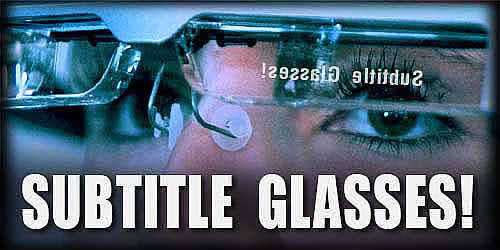
![]() Inclusion can mean different things to different people. A person with hearing loss may feel included when hearing people join that person at a screening where captions are on-screen, for all to see. A hearing person may feel they are being inclusive by providing an adaptive aid that enables the person with hearing loss join them in a regular, non-captioned show.
Inclusion can mean different things to different people. A person with hearing loss may feel included when hearing people join that person at a screening where captions are on-screen, for all to see. A hearing person may feel they are being inclusive by providing an adaptive aid that enables the person with hearing loss join them in a regular, non-captioned show.
SUBTITLE GLASSES
Details HERE: https://www.watchword.cc
More info HERE
Product spec HERE
Click for link to Trial findings
Oct 2024: UK Film Distributors' Association:
"We should all be striving to improve accessibility ... We know that there is a general increase in audiences choosing to watch captioned content either on mobile devices or at home ... 61 percent of 18–24-year-olds and 13 percent of 50–64-year-olds , equating to over a quarter of the population – suggesting that captioned shows are now more likely to be accepted by general audiences, not just the deaf community"
March 2024: UK Cinema Association:
"Despite its strong reputation for delivering accessible cinema, the UK cinema sector faces a particular challenge around the provision of open captioned (or descriptive subtitled) screenings for deaf and hard of hearing customers, general experience being that the wider audience is resistant to such screenings, and so their programming remains comparatively limited given its impact on admissions"
"Developed with funding support from the UK Cinema Association, WatchWord provides a personalised solution, delivering captions through a pair of ‘smart’ glasses. Built For Good Technology [WatchWord developers] plans for a nationwide roll-out of the solution"
"... the experience of many cinema operators is that the wider audience remains in general resistant to captioned screenings, with a resultant impact on admissions and box office revenues ... many major film releases are now promoted through accompanying subtitled film trailers, these being played in the pre-show before an open captioned film performance"
"... monitoring the utilisation of new and emerging technologies to deliver more reliable and more importantly audience-friendly solutions for delivering accessible cinema. The primary challenge here is the provision and delivery of descriptive subtitles or ‘closed captioned’ screenings, something which would make the big screen experience more accessible not just for deaf and hard of hearing customers, but also for their family and friends, who often as a consequence find their own cinema-going opportunities limited..."
"... Responding to increasing interest ... a structured exercise to develop a viable and market ready smart glassed-based ‘closed captions’ solution, where only the person who requires the subtitles will see them ... 2023 was the year this work really hit its stride, with Built For Good Technology undertaking a number of rounds of in-cinema testing which helped fine-tune the solution in operational terms as well as improving the user experience ... a ‘live’ two-month trial of the solution – now called WatchWord – at a number of cinemas in order to gather further operational feedback, with the hope that the solution would then be ready for roll-out in 2024"
Customer review HERE
Details HERE
June 2024: ScreenDaily: One barrier that looks as if it has completely disappeared among younger filmgoers is an aversion to subtitles. “…young people often enjoy subtitles, whether that’s subtitles from a foreign-language film … Instagram … TikTok” https://tinyurl.com/2024Subtitles
May 2024: Australia: Deaf people taking cinemas to court over lack of captioned screenings.
May 2024: BBC News: Sheffield study calls for 'better' film captions
Jan 2024: Subtitle Glasses trial at UK cinemas!
More info • Video • Spec sheet PDF
April 2023: YouTube video of new AR glasses
August 2022: New AR glasses
April 2022: Built For Good Technology working with UKCA to investigate caption glasses.
May 2022: RNID statement: Subtitled screenings in cinemas – the only way to increase access now.
![]() RNID's open letter to the UK Cinema Association (UKCA) – do more to make cinemas inclusive for deaf people now.
RNID's open letter to the UK Cinema Association (UKCA) – do more to make cinemas inclusive for deaf people now.
We [RNID] are disappointed with the UK Cinema Association’s efforts to improve access to cinemas for those who are deaf or have hearing loss. The only way that deaf people and those with hearing loss can currently access cinemas is through more subtitled screenings.
Shockingly, BBC’s Rip Off Britain (series 14, episode 3, 4 May 2022) highlighted that the number of subtitled cinema screenings is incredibly low. They found that across four cities in a week, Odeon only subtitled 17 of 920 screenings (1.8%), Cineworld subtitled 12 of 1070 screenings (1.1%) and Vue subtitled 8 of 819 screenings (0.98%).
The UKCA’s temporary increase of subtitled screenings during Deaf Awareness Week was not enough to improve access to subtitles, and data from the National Deaf Children’s Society (NDCS) showed that a quarter of UK cinemas failed to show any subtitled screenings during Deaf Awareness Week. This is not good enough.
Previously, we have partnered with the UKCA on several initiatives, including their Technology Challenge which aims to find technology-based solutions to improve access to cinemas for people who are deaf or have hearing loss. But there has been a failure to prioritise pushing for subtitled screenings, and we have seen no improvement in the accessibility of cinemas, or to the lives of the 12 million people in the UK who are deaf or have hearing loss and the 7.1 million who have tinnitus.
We believe that increasing subtitled screenings is the best way to improve access and will have a bigger impact for our communities more quickly. We are therefore suspending direct engagement with UKCA on their Disability Working Group but remain open to working with cinemas directly to increase subtitled screenings, and the UKCA if they are able to show that they are committed to making cinemas accessible for everyone, now.
![]() RNID's open letter to UKCA:
RNID's open letter to UKCA:
Chief Executive, UK Cinema Association
I’m writing to let you know that, given the lack of meaningful progress in our work together, we have decided that we will no longer be an active part of your work on accessible cinemas.
As an organisation, we are disappointed with the lack of engagement with us over the last three years, and the lack of real action taken to make cinemas accessible for people with hearing loss. At times, commitment to this work has felt shallow and tokenistic, and we believe we can make more progress for our communities by working directly with cinemas.
Deaf Awareness Week
The UKCA’s decision to increase the number of subtitled screenings during Deaf Awareness Week – but then drop back to original numbers after the week is over – is one example of that tokenistic approach. In fact, looking at the Accessible Screenings website, it appears that subtitled screenings during this week are in fact still incredibly rare.
Ahead of Deaf Awareness Week, we were clear that a temporary uplift in subtitled showings is simply not good enough and would not be received well by deaf people and people with hearing loss. The negative response from our partners and communities to this activity is not a surprise, and I sincerely hope that the UKCA are listening and will take note of the reaction.
Technology Challenge
RNID had been a partner in the UKCA’s Tech Challenge, since 2018 but the lack of updates and progress to the panel in the last two years led us to decide to step away from the project, but we were clear we remained happy to engage with you on promotion of subtitles in cinemas which we feel could be used to improve access to cinemas for deaf people now.
The UKCA made a comment last week saying that subtitles and technological solutions were not “an either/ or” and with this in mind, we are keen to know why there has been such slow progress on the delivery of screenings with subtitles across cinemas in the UK, and why the UKCA has not engaged with concerns about the lack of provision of subtitled screenings in good faith on behalf of its members. Even under the new timeline of delivery for the Technology Challenge, deaf people and people with hearing loss will not be able to benefit from this new technology in the short term and the barriers to accessing cinemas will remain. The lack of forward movement within this group led us, as you know, to withdraw our participation in it back in January, as we believe focusing efforts on increasing and promoting subtitled screenings will have a greater impact for our communities.
Subtitle provision in cinemas
As highlighted on the BBC’s Rip Off Britain last week, across four cities, Odeon had 920 screenings, 17 of which were captioned (1.8%). Cineworld had 1070 screenings, 12 captioned (1.1%). Vue had 819 screenings, 8 captioned (0.98%). These figures fail to capture the timings for accessible screenings, which are typically limited to off-peak times. We would suggest that not only is this bad for accessibility, but it doesn’t make good business sense either. 1 in 5 adults in the UK are deaf or have some form of hearing loss. That’s a huge market to ignore. The success of international films such as Parasite and the film CODA which had embedded subtitles, show that audiences will turn up to screenings with subtitles.
We know that being able to participate in cultural events like cinema releases is hugely important to people who are deaf or have hearing loss, which is why we’re keen to see accessibility prioritised sooner rather than later. Of course, at RNID our door is open to any cinemas looking to make screenings accessible but for us to re-engage with the UKCA we would need you to demonstrate that you are serious about improving accessibility and are prepared to engage meaningfully with us and the community we serve. If you would like to discuss this further, you can contact our Inclusion Policy Advisor.
Kind regards,
Teri Devine
RNID Associate Director for Inclusion
May 2022: UK Cinema Association:
![]() "Trials of the glasses were necessarily paused as a result of the pandemic, during which time the team working on them left the NT and established themselves as Built for Good Technology. We are now working with them again with a view to a further trial later in the year"
"Trials of the glasses were necessarily paused as a result of the pandemic, during which time the team working on them left the NT and established themselves as Built for Good Technology. We are now working with them again with a view to a further trial later in the year"
UK Cinema Association: "SUBTITLING TECHNOLOGY CHALLENGE FUND. The STC fund is aimed at finding a smart solution to in-cinema subtitling for those with hearing loss. The ongoing pandemic related disruption of the past two years has meant that this UKCA project had to be placed on temporary hold. However, in late 2021 the Association was able to pick this work strand up again and there is now a clear direction of travel to further develop a smart glasses solution for those who would benefit from in-cinema subtitling"
Previously:
UKCA recommends to its members that cinemas should:
![]() 'endeavour to show more captioned films more frequently'. It said: 'The positive response in recent years from audiences to accessible screenings has seen more and more UK cinemas look to offer these screenings ... there is still a need for more cinemas to participate to ensure there are more opportunities to enjoy the big screen experience"
'endeavour to show more captioned films more frequently'. It said: 'The positive response in recent years from audiences to accessible screenings has seen more and more UK cinemas look to offer these screenings ... there is still a need for more cinemas to participate to ensure there are more opportunities to enjoy the big screen experience"
It said:
![]() "Prior to the pandemic, the [cinema] sector had seen a steady growth in [English language] captioned screenings ... there is clearly more to do in this area ... exploring opportunities to deliver more personalised solutions ... a good deal of optimism and a clear way forward to developing a workable smart [caption] glasses solution"
"Prior to the pandemic, the [cinema] sector had seen a steady growth in [English language] captioned screenings ... there is clearly more to do in this area ... exploring opportunities to deliver more personalised solutions ... a good deal of optimism and a clear way forward to developing a workable smart [caption] glasses solution"
![]() "closely following a number of app-based personalised solutions that deliver audio description [for film fans with sight loss] through a person’s own smartphone or similar device ... Despite some initial progress, very little of substance has materialised from these approaches to meet the needs of customers while at the same time offering the level of content security that the major US studios demand for their titles. With that in mind it is hoped that [in 2022] pick up previous discussions about possibly creating an industry-wide set of technological standards for such apps"
"closely following a number of app-based personalised solutions that deliver audio description [for film fans with sight loss] through a person’s own smartphone or similar device ... Despite some initial progress, very little of substance has materialised from these approaches to meet the needs of customers while at the same time offering the level of content security that the major US studios demand for their titles. With that in mind it is hoped that [in 2022] pick up previous discussions about possibly creating an industry-wide set of technological standards for such apps"
![]() @Cinema_UK "We are still focussed on developing an accessible ‘closed caption’ solution for audiences. The lockdown – and changes at partner organisations – delayed pilots of the most promising ideas, but we are now picking this up again, looking also at technology which has since emerged ... In developing new solutions, we will continue to work with an advisory group including not just @RNID and @NDCS_UK but also a number of deaf and hard of hearing cinema-goers"
@Cinema_UK "We are still focussed on developing an accessible ‘closed caption’ solution for audiences. The lockdown – and changes at partner organisations – delayed pilots of the most promising ideas, but we are now picking this up again, looking also at technology which has since emerged ... In developing new solutions, we will continue to work with an advisory group including not just @RNID and @NDCS_UK but also a number of deaf and hard of hearing cinema-goers"
![]() "The Technology Challenge Fund was established to explore new ways of delivering ‘closed captions’ only to those who needed them, but potentially for all cinema screenings, massively widening the range of films available to deaf customers, and their ability to enjoy the big screen experience with friends and family.
"The Technology Challenge Fund was established to explore new ways of delivering ‘closed captions’ only to those who needed them, but potentially for all cinema screenings, massively widening the range of films available to deaf customers, and their ability to enjoy the big screen experience with friends and family.
![]() 'Having towards the end of 2019 identified two preferred options for its second (and final) phase of funding – both adapted eyewear solutions, developed by Screen Language and the National Theatre respectively – the Association spent the early months of this year supporting the undertaking of further feasibility tests on the two solutions. At that point, a decision was made not to pursue the Screen Language option on the basis that further development would require a great deal of additional work and funding, with little evidence that a solution feasible in a cinema environment could be delivered. That said, the Association will remain in contact with the company as they develop their concept with separate funding.
'Having towards the end of 2019 identified two preferred options for its second (and final) phase of funding – both adapted eyewear solutions, developed by Screen Language and the National Theatre respectively – the Association spent the early months of this year supporting the undertaking of further feasibility tests on the two solutions. At that point, a decision was made not to pursue the Screen Language option on the basis that further development would require a great deal of additional work and funding, with little evidence that a solution feasible in a cinema environment could be delivered. That said, the Association will remain in contact with the company as they develop their concept with separate funding.
![]() 'The sole focus of attention going forward therefore became the specially-adapted ‘smart caption’ glasses developed by the National Theatre and already shown to be of proven value in the theatre environment. With successful testing and configuration of the system to the cinema environment achieved, in Jan the BFI London Short Film Festival hosted the first UK pilot of the glasses for deaf and hard of hearing audiences. In total, 30 devices were made available for audiences to book and use across a significant number of the festival’s performances. A hugely exciting milestone for the Fund, this exercise provided much greater understanding of the operational practicalities of supporting these devices in cinemas, as well as valuable feedback from users. As a result of the latter in particular, issues around the comfort and weight of the glasses were identified.
'The sole focus of attention going forward therefore became the specially-adapted ‘smart caption’ glasses developed by the National Theatre and already shown to be of proven value in the theatre environment. With successful testing and configuration of the system to the cinema environment achieved, in Jan the BFI London Short Film Festival hosted the first UK pilot of the glasses for deaf and hard of hearing audiences. In total, 30 devices were made available for audiences to book and use across a significant number of the festival’s performances. A hugely exciting milestone for the Fund, this exercise provided much greater understanding of the operational practicalities of supporting these devices in cinemas, as well as valuable feedback from users. As a result of the latter in particular, issues around the comfort and weight of the glasses were identified.
![]() 'While the lockdown of the UK sector arising from COVID-19 has unfortunately put a stop to further development and testing, the plan remans as soon as possible to begin that process again, and to begin a discussion with the glasses manufacturer Epson on the potential there might be to simplify the current hardware, making it both more comfortable and affordable."
'While the lockdown of the UK sector arising from COVID-19 has unfortunately put a stop to further development and testing, the plan remans as soon as possible to begin that process again, and to begin a discussion with the glasses manufacturer Epson on the potential there might be to simplify the current hardware, making it both more comfortable and affordable."
Smartphones can also be personal access solutions, via a variety of free apps. Some cinemas allow these apps to be used (if dimmed and silent) but as yet, no official infrastructure is in place to synchronise/stream a caption track from a cinema server to a phone. Smartphone 'caption' apps require the user to hold the phone in position for the length of the film, ideally level with the bottom of the cinema screen.
A robust, stable personal adaptive aid could help reduce the number of scheduling/operational issues that can sometimes occur with 'special/out of the ordinary' screenings. If a caption track is 'on', all of the time (but can only be seen by customers using a personal device), the chances of a member of staff failing to set it to 'on' for a scheduled show are reduced. Mistakes rarely happen (only a handful of around 1,600 weekly English-language captioned screenings go wrong), but the consequences of an abruptly-cancelled show can be very serious. Customers that depend on captions for their film enjoyment can't just wait for the next show, or come back tomorrow, or next week. They will often have had only ONE chance to enjoy the film on the big screen. They may have travelled far and incurred costs.
The potential reach of personal caption solutions is huge. With built-in multi-language features, captions could be broadcast in a choice of languages that are popular in the UK. Feedback to YourLocalCinema: "This is not a complaint. Thought you might like to know of our experience attending a captioned film in Salisbury. Upon arriving, having travelled 21 miles from home, there was a notice on the door stating, "Sorry, 'Theory of Everything' is sold out" ... Unfortunately for us, 93 Spanish language students had booked. Kind regards and thanks for all you do"
A personal 'always on' access solution could bring cinemas in line with home entertainment access levels. They may never be as acceptable to deaf people as TV/internet (on-screen) captions, but tech solutions can provide 100% access to all cinemas, all screens, all popular films, all days & times. Eventually, accessible screenings could be ubiquitous access facilities - like beeping traffic crossings, audio/text bus/train announcements, accessible toilets/parking spaces, ramps, elevators, wheelchair spaces etc.
NEWS: US cinemas follow UK cinemas lead on subtitling/captioning:
https://www.washingtonpost.com
WHAT IS THE UK CINEMA INDUSTRY DOING TO HELP IMPROVE ACCESS?
The UK cinema industry says it is determined to help ensure that people with hearing loss can enjoy the cinema experience and continually investigates developments in the area of accessible cinema. A percentage of income from the industry's ‘Carer goes free’ discount card scheme, where 100,000+ people pay £6 annually, is allocated to be spent on cinema access schemes.
![]() The UK Cinema Association's 2018 Annual Report stated 'Subtitling ... general unwillingness of the wider audience to embrace such screenings – and the resultant reluctance of cinema operators therefore to schedule them at peak times – has resulted in fewer captioned screenings, and less at peak times, than many deaf and hard of hearing customers would like, something which became the subject of increasing sociable media comment during the year, culminating in at least two high profile petitions demanding that cinemas increase their provision in this area ... sat down with those behind these petitions, both to hear their views and explore how the industry might if possible respond"
The UK Cinema Association's 2018 Annual Report stated 'Subtitling ... general unwillingness of the wider audience to embrace such screenings – and the resultant reluctance of cinema operators therefore to schedule them at peak times – has resulted in fewer captioned screenings, and less at peak times, than many deaf and hard of hearing customers would like, something which became the subject of increasing sociable media comment during the year, culminating in at least two high profile petitions demanding that cinemas increase their provision in this area ... sat down with those behind these petitions, both to hear their views and explore how the industry might if possible respond"
![]() £75,000 CINEMA SUBTITLING CHALLENGE FUND.
£75,000 CINEMA SUBTITLING CHALLENGE FUND.
"The UK Cinema Association (UKCA) and Action On Hearing Loss (RNID) are excited to launch this new challenge fund ... the development of a solution that will allow people with hearing loss to have a more inclusive cinema experience ... help to find a suitable commercial partner to develop and create a market-ready product ... cinemas committed to trialing any viable solutions".
March 2020 article on the fund HERE
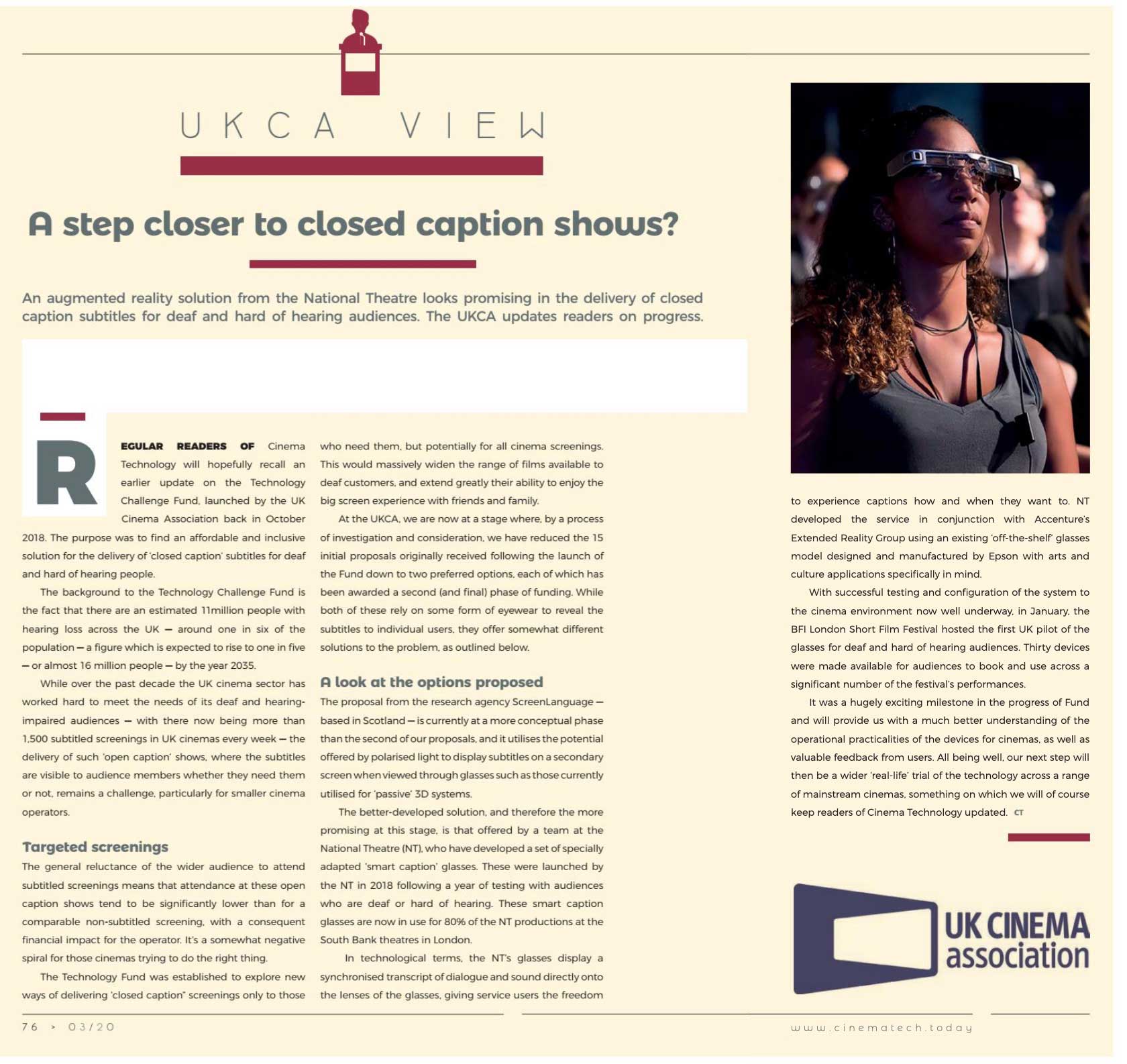
Sep 2019 UKCA article on the fund HERE
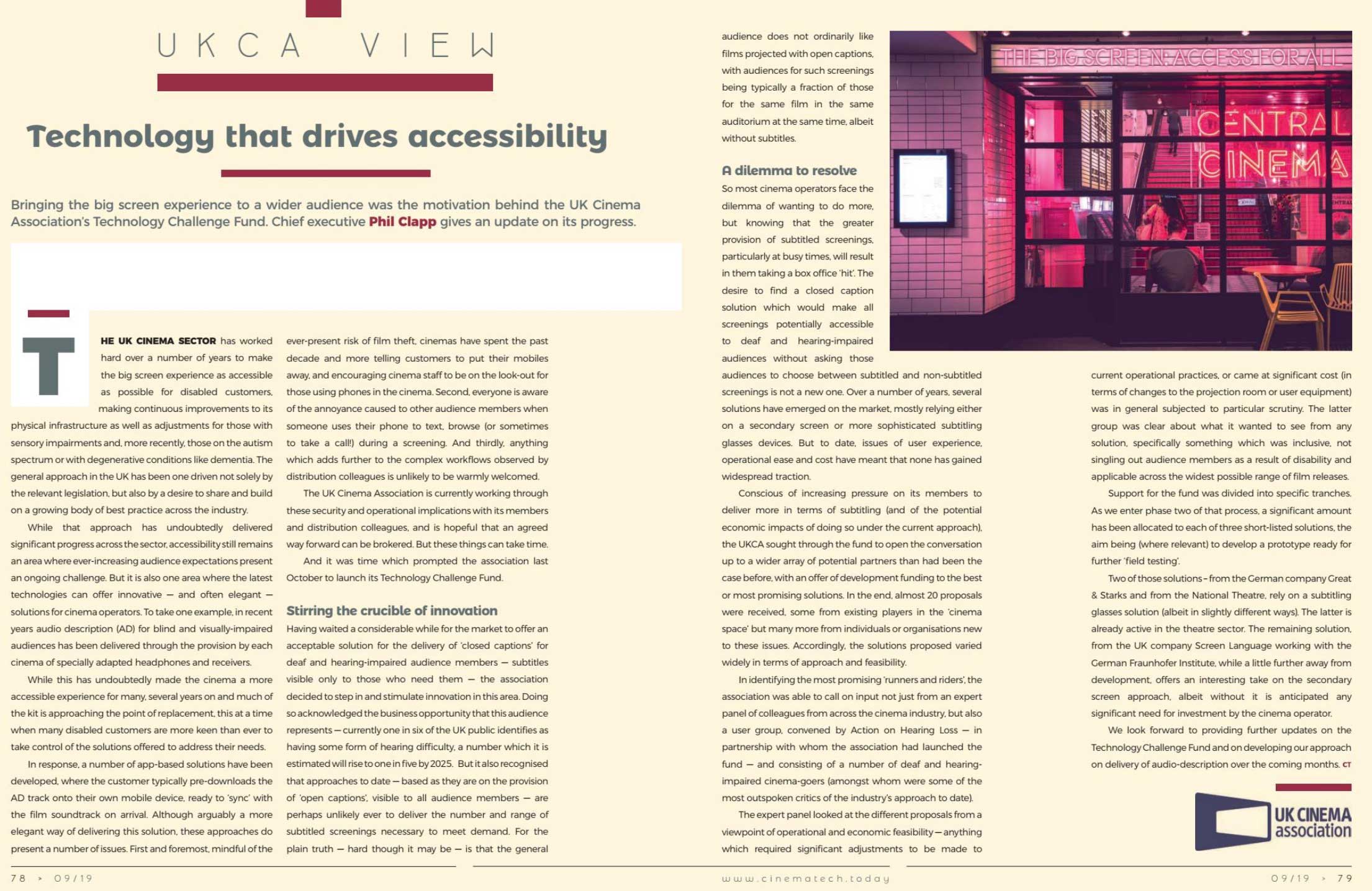
Dec 2018 UKCA article on the fund HERE
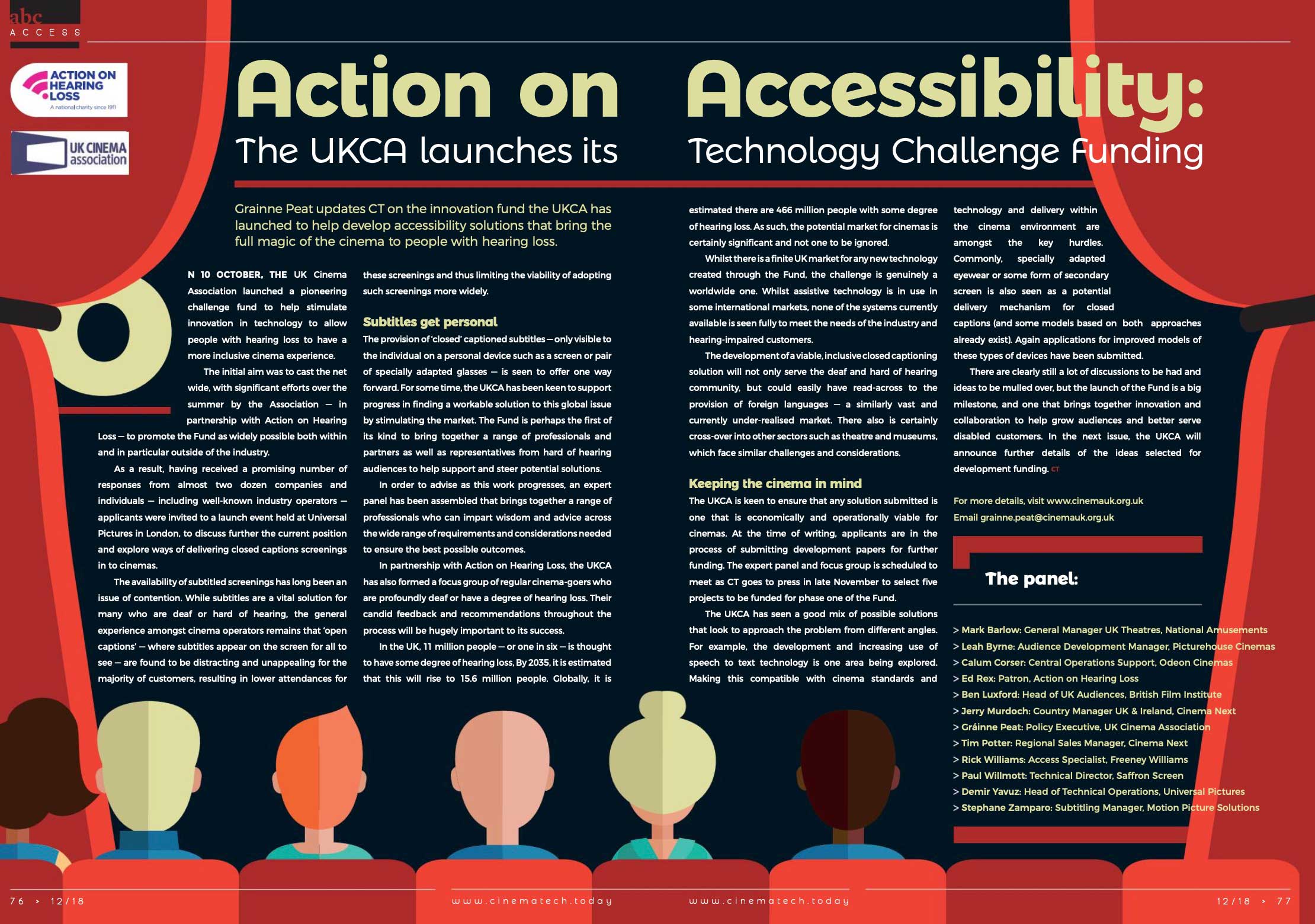
June 2018 UKCA article on the fund HERE & HERE
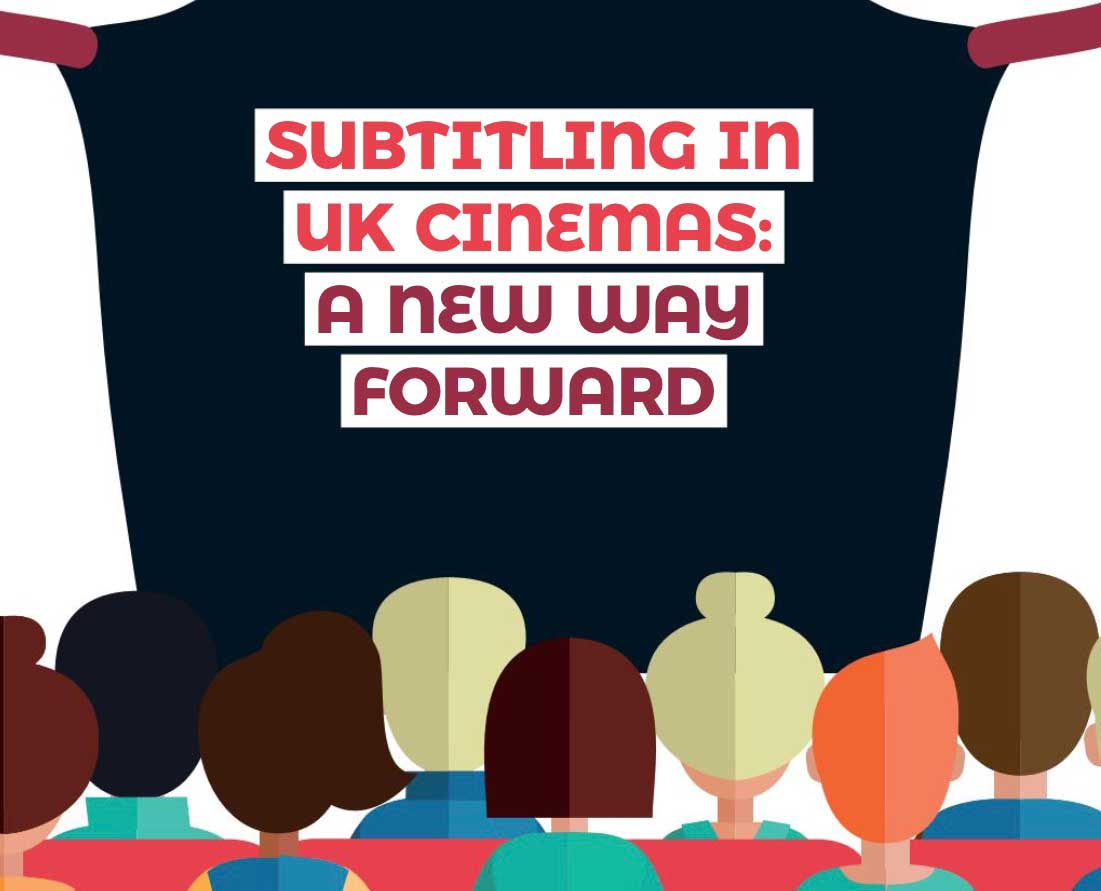
March 2017 UKCA article on cinema access solutions HERE & HERE & HERE
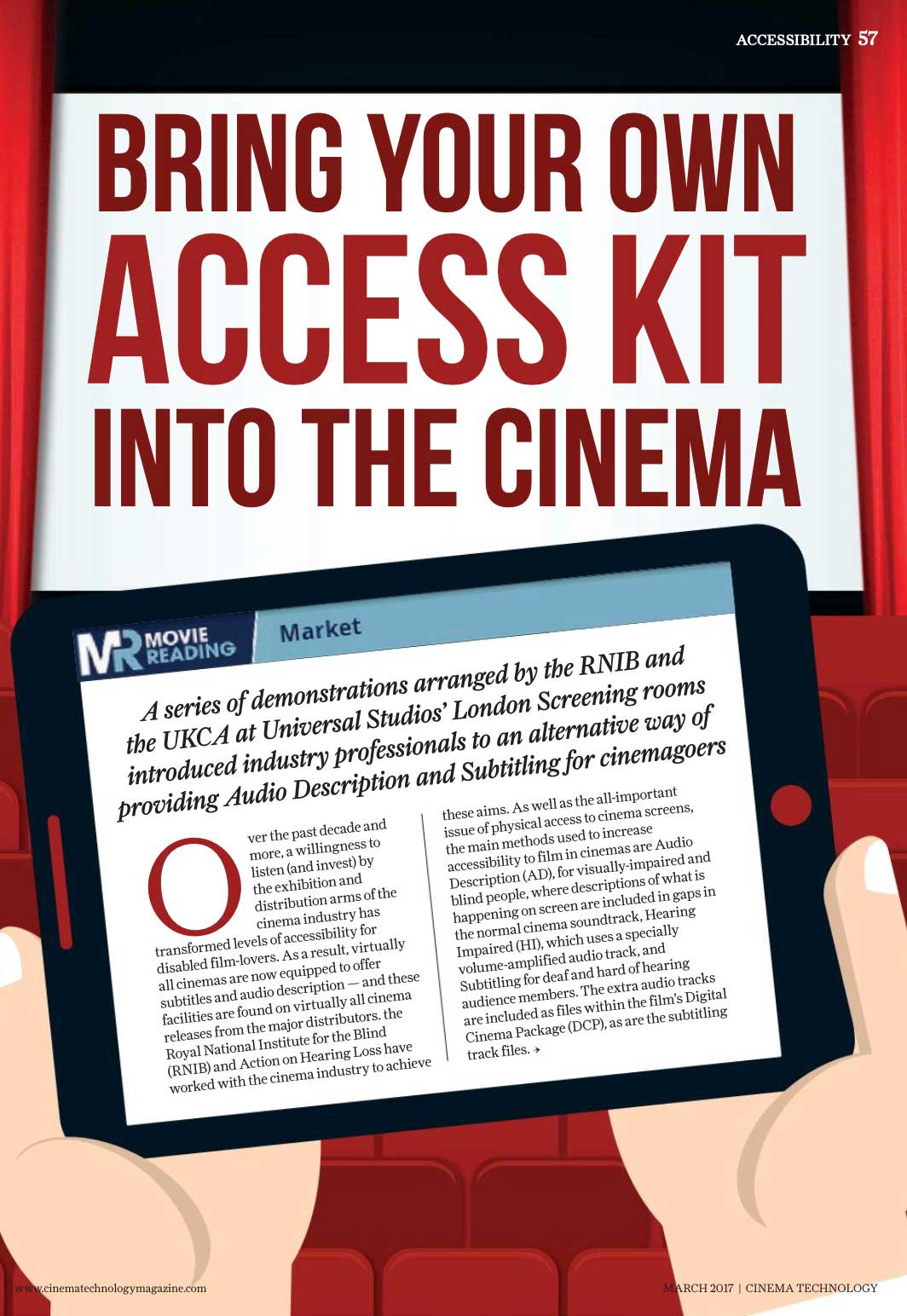
CAN CINEMA TRAILERS BE ACCESSIBLE TOO?
Many film trailers are also provided to cinemas with a caption track, and delivered to cinemas automatically. If not, cinemas can ask the films' distributor for the track. Cinemas can then, if they want to, set this track to 'on' at captioned screenings.
If the caption track was switched on for trailers shown at scheduled captioned screenings, not only would customers with hearing loss receive an equal service, they could also relax before the show, in the knowledge that the captions are switched on.
Thanks to Paramount, who created and distribute the film, for 'Mission Impossible: The Final Reckoning' (May 2025), subtitled adverts from 29 companies were made available to cinemas to screen before the film. Digital Cinema Media (DCM) produces subtitle/caption tracke for cinemas for free.
Every week, at some cinema, somewhere in the UK, a caption track for a scheduled captioned show fails to appear on the screen. When this happens, audience members (that have paid for and expect a captioned show) usually notice captions are missing as soon as the first words are spoken on screen. (Lips move, but no captions appear). This usually results in a frantic search for a member of staff to 'Switch the captions on!’ Usually, the film is restarted, the captions appear, and customers are satisfied. But sometimes - for whatever reason - the scheduled captioned show continues to play WITHOUT captions, resulting in a very disgruntled customer, a wasted journey, a couple of free cinema passes, but NO other opportunity to catch the film on the big screen.
Ensuring that trailers are shown with captions - and linked to the captioned film about to play - would help to avoid the frustrating uncertainty: 'Will the film be captioned?' In theory, if the trailer is captioned, the film will be captioned. If not, a customer could inform a member of staff, who would have time to resolve the issue before the main feature starts.
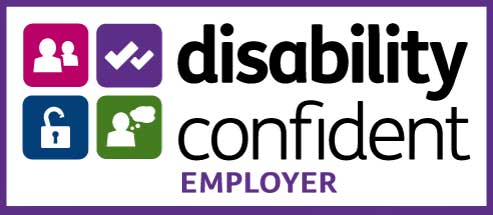
How does YourLocalCinema differ from other listings sites?
YourLocalCinema is an audience development agency financially supported by Film Distributors' Association (FDA) / UK film distributors and the British Film Institute (BFI).
YourLocalCinema began as a grassroots, social outreach movement to enable deaf children to socialise at cinemas with their families and friends. It was initially funded by, amongst others, UK cinemas and the RNID & NDCS hearing loss charities.
Co-founded and co-managed by a profoundly deaf film fan, YourLocalCinema can relate to issues deaf cinema audiences face. It ensures that film fans with hearing loss can directly engage and correspond in a variety of welcoming, valued, deaf-friendly correspondence formats that include text messaging, live chat, email, Facebook, WhatsApp, very active Twitter, and, if necessary, sign-language via Zoom.
YourLocalCinema provides a YouTube channel with the latest film trailers in an accessible, captioned format, and a searchable website DEDICATED to clear listings of English-language subtitled/captioned screenings. It also offers a unique, personalised link that when saved to a smartphone's home screen, requires just ONE CLICK to view details of ALL captioned screenings nearby.
YourLocalCinema has two decades of experience in developing audiences for captioned cinema and has never failed to deliver its weekly, targeted direct email/social media/mobile newsletter that promotes English-language subtitled/captioned screenings DIRECT to its unique database of tens of thousands of film fans with hearing loss.
The YourLocalCinema.com website serves more than a million visits annually, helping to drive thousands of customers to hundreds of cinemas each week.
In 2024, YourLocalCinema promoted 80,000+ captioned English-language screenings of 400+ films, across almost all UK/IRE cinemas. Screenings are promoted DIRECT to the target audience of thousands of film fans with hearing loss. More than a million customers attend captioned screenings each year. Attendance has tripled since 2010.
YourLocalCinema provides valued customer service and engagement, which has ensured the loyalty of a large and appreciative customer base, which in turn has driven revenue to distributors & cinemas. This virtuous circle has reinforced itself for two decades.
For people that require subtitles/captions for their film enjoyment, there’s often only one chance to catch a film at the cinema. When it comes to accessible listings, accuracy is the most important element. The YourLocalCinema.com website is updated three times daily. Listings are checked for accuracy. Many cinemas are contacted weekly to verify any discrepancies. YourLocalCinema is efficient, flexible, and can adapt to short-notice changes in cinema schedules swiftly and seamlessly. Staff are available around cinema's opening times, including evenings and weekends, to amend any errors/changes in cinemas' schedules.
YourLocalCinema produces regular progress reports on how cinemas are doing regarding accessible films/screenings/days/am/pm times and regularly provides data to be used in press releases, news reports and social media comment.
YourLocalCinema has many satisfied customers! BFI survey feedback: More people clicked 5 out of 5 stars than any other figure.
Accessible, inclusive subtitled/captioned screenings enable film fans with hearing loss to ENJOY rather than endure cinema. For a few hours, the disabling barrier is removed. They provide social benefits such as equality, inclusion and community integration.
Accessible, inclusive screenings benefit people of all ages. Each year in the UK, hundreds of children are born with significant hearing loss. It's estimated that more than ten million, including thousands of young people, have hearing loss. Our society is ageing, and with ageing, loss of some hearing is inevitable. Access to film - via subtitles/captions - is something that we may all appreciate, eventually.
YourLocalCinema has two decades of experience in developing audiences for captioned cinema. It has built much of the audience for captioned screenings.
YourLocalCinema sends regular reminders to many inaccessible cinemas - to please be accessible.
YourLocalCinema has a long legacy as a trusted source of information. A household name amongst the target audience - children, young people and adults with hearing loss who enjoy cinema. Each week, YourLocalCinema reaches tens of thousands of this audience, who then use the site to plan their cinema-going.
YourLocalCinema helped persuaded UK film distributors to ensure that cinema trailers were subtitled/captioned. The eventual aim is for UK film distributors to routinely produce and provide trailer caption tracks to cinemas, and then for cinemas to screen captioned trailers at scheduled captioned screenings.
YourLocalCinema continues to create awareness of cinema access/inclusion issues by engaging as many social media users as possible. YourLocalCinema has built solid, lasting relationships with many bloggers, reporters, and social media advocates/influencers in the fields of access/inclusion/hearing loss. New relationships are constantly fostered through regular activity on social media channels, creating informative, relevant, content that can be easily shared through social media and email.
YourLocalCinema produces detailed and engaging research/articles/charts/data that often provides the audience/film industry/BFI with new insight into the important issues of cinema access/inclusion.
YourLocalCinema provided 10+ years of data/reports the UK film industry’s 'Disability Working Group', an industry think tank that includes charities representing people with disabilities, film companies, and cinema companies.
YourLocalCinema is, according to Google, the most popular, useful & informative website for its target audience - film fans with hearing loss. Search terms such as 'cinema captions' or 'captioned cinema' generate millions of results. The YourLocalCinema site is usually the first result - number one. Appearing on the first page of a Google search increases visibility, and therefore traffic to the YourLocalCinema website. YourLocalCinema.com is ahead of all other cinema-industry sites for caption-related searches. It reached the top because Google believes it to be an authoritative site that provides clarity, quality, relevant content, as well as endorsement from other credible, authoritative websites. Google aims to provide the most relevant and reliable information. The more authoritative a website is, the more visitors Google will send its way. There are thousands of websites that mention 'captioned cinema', but according to Google, None listed. Ask the cinema to schedule more accessible screenings! are as credible, authoritative and useful as YourLocalCinema.com.
YourLocalCinema has been in business/online for a long time - more than two decades - and has built a positive reputation amongst its users, who trust the accurate and reliable information presented on the YLC site.
YourLocalCinema regularly provides data to be used in press releases, news reports, presentations, speeches and social media comment. It has provided source data for, amongst others, RNID, NDCS, BDA, Sky/C4/C5 news, The Times, The Guardian, Daily Mail, BBC TV, iNews, ICO Screening Days, ScreenTrade mag, Den of Geek, FDA, BFI, CinemaTech, and many researchers/social media influencers in the access field.
YourLocalCinema has, for more than a decade, collaborated with INTO Film to ensure that its annual film festival is inclusive to audiences with hearing loss. Information on accessible cinema is distributed to every primary and secondary school in the UK, which creates mass awareness of cinema access & inclusion amongst hundreds of thousands of young people nationwide.
YourLocalCinema keeps the UK film industry informed of tech progress. In 2010, YourLocalCinema suggested to the UK cinema industry that it should run a news-worthy competition for companies/tech-minded individuals to come up with consumer-friendly ‘cinema captions’ ideas, then support research & development to help bring a suitable product to market. (In 2018 the industry did just that).
YourLocalCinema has helped the BFI, UKCA and others to round up attendees and focus group participants for full-house film industry events to address both the fiscal and technical challenges of cinema access 'adaptive aids', such as caption glasses, separate displays and smartphones.
YourLocalCinema has many 'satisfied customers' - Each year BFI requests a YourLocalCinema.com user survey. In 2022 1,000 cinema-goers were surveyed. Feedback: Most users reported that they were very satisfied with YourLocalCinema's service. More people clicked 5 out of 5 than any other figure.
YourLocalCinema helps cinemas make money. The Independent Cinema Office report 'Developing Deaf Audiences in Your Cinema' states YourLocalCinema as the most commonly-cited source of information for deaf audiences to find out about subtitled/captioned screenings. A number of respondents cited YourLocalCinema.com as the most reliable resource for finding captioned screenings rather than the websites of cinemas.
YourLocalCinema provides regular data on captioned screenings data for the NDCS, which is used to generate media coverage
YourLocalCinema provides this FAQ page, informing users about how accessible cinema works, the service that they can expect from cinemas, and their rights regarding access, equality and inclusion.
YourLocalCinema provides good customer service and engagement, which has ensured the loyalty of a large and appreciative customer base, which in turn has driven revenue to distributors & cinemas. This virtuous circle has reinforced itself for two decades.
WHAT HAS THE BFI RECOMMENDED TO THE UK FILM INDUSTRY, REGARDING ACCESS/INCLUSION?
The BFI is a UK public body which awards money raised from the sale of National Lottery tickets to film-related projects. Last year it received around £97m from the Lottery and awarded £48 million to film-related projects. Since 2011 it has awarded more than £220 million. It has supported YourLocalCinema since 2004. The BFI has recommended the UK cinema industry improve access to film fans with hearing or sight loss.
![]() Its 2002 report stated: 'Evidence from the USA suggests that legislation and the market alone will not deliver the kind of widespread access which cinema patrons with sensory loss need and want ... things required to make it happen: A level of investment which creates critical mass in the market place ... Open [on-screen] captions means a limited number of screenings. What is important is that such screenings are regular and well publicised'. It recommended: 'The reaction of hearing audiences to open captions should be formally tested with a view to determining an ‘acceptable level’ of open screenings. Continue to monitor customer feedback ... A national promotion/publicity drive to encourage people with sensory impairments to visit the cinema ... The website resource YourLocalCinema needs to be put on a firmer financial footing'
Its 2002 report stated: 'Evidence from the USA suggests that legislation and the market alone will not deliver the kind of widespread access which cinema patrons with sensory loss need and want ... things required to make it happen: A level of investment which creates critical mass in the market place ... Open [on-screen] captions means a limited number of screenings. What is important is that such screenings are regular and well publicised'. It recommended: 'The reaction of hearing audiences to open captions should be formally tested with a view to determining an ‘acceptable level’ of open screenings. Continue to monitor customer feedback ... A national promotion/publicity drive to encourage people with sensory impairments to visit the cinema ... The website resource YourLocalCinema needs to be put on a firmer financial footing'
The recommendations above helped create the UK's first 'Cinema Access Scheme'. In 2002, a few dozen cinemas began to test and eventually trialed the DTS Cinema Subtitling Solution, which was eventually adopted by hundreds of UK cinemas. Many cinemas adopted a similar product (Dolby ScreenTalk). Thanks to the rise of digital cinema, those 35mm film/disc-based solutions are now obsolete.
The success of the Cinema Access Scheme, which was mostly England-based, helped to introduce similar schemes to Northern Ireland, Scotland and Wales. (In 2004 YourLocalCinema became the official 'marketing arm' for all of those schemes, growing the audience for accessible cinema along the way).
![]() YourLocalCinema has since helped research and produce many industry reports. The BFI 'Study of cinema access and film consumption for audiences with sensory impairments' report stated: '83% of people with hearing loss said they would attend cinema regularly if a nearby cinema had captioned screenings at convenient times'. Recommendations: 'Increase choice of films, showtimes, number of films ... Establish industry standards ... Promote efficient advertising'
YourLocalCinema has since helped research and produce many industry reports. The BFI 'Study of cinema access and film consumption for audiences with sensory impairments' report stated: '83% of people with hearing loss said they would attend cinema regularly if a nearby cinema had captioned screenings at convenient times'. Recommendations: 'Increase choice of films, showtimes, number of films ... Establish industry standards ... Promote efficient advertising'
The UKFC/BFI 'Diversity Report': 'ensure that equality and diversity commitments are fully integrated ... enable all groups within our society to participate in and enjoy film culture .. ensure full and equal access to film for people with disabilities, particularly as audiences'
The BFI 'Disability Equality Scheme': 'access, inclusion and diversity issues to become mainstreamed ... continue to fund YourLocalCinema, based on its success and evaluation reports with high levels of satisfaction from disabled users'
The 'Peer Review of the UK Film Council', commissioned by the DCMS: 'improve access and inclusion for all ... continued support of the YourLocalCinema service'
BFI 'Policy and funding priorities for the next three years' consultation: Around 1,000 responses received, including a 'strong showing of responses from deaf and blind people and their representatives, calling for continued support for accessible screenings in cinemas'
An ICO report funded by the BFI’s Film Audience Network: ‘more could be done for people who are affected by deafness ... create real change so that the cinema can be the same transformative experience as it is for hearing patrons’
The BFI ‘2022’ report: ‘BFI is committed to ensuring that the cinema experience is open to all, especially to disabled audiences ... we have placed diversity and inclusion at the heart of our objectives ... clearly a moral imperative for society generally ... work with partners to ensure that all audiences have the opportunity to enjoy film ... . Film has the power to engage all sections of society ... Inequality in access to culture is bad for business and bad for society'
In 2013, the UK cinema industry tested three 'personal' caption solutions (Sony glasses and Dolby & USL displays). The product considered most suitable for the industry (glasses), was also the most expensive (at around £1,000 per unit). In late 2014, Sony reduced costs by around 25%, and the UKCA began to consider plans for a controlled ‘real life’ pilot. But in 2015, after four years development and UK sales efforts, Sony decided to withdraw the product from UK/Euro markets. Its press releases stated: ‘Sony recognises inclusion as essential, but is also aware of the need for a more robust and commercially viable solution for our customer’s needs.’
Accurate, targeted listings of accessible screenings should be an integral part of any caption solution company's sales strategy. Market the BENEFITS of the product, rather than the product itself, directly to the target audience - film fans with hearing loss.
WHAT CAN BE DONE TO ENGAGE THE AGEING AUDIENCE?
YourLocalCinema aims to work closely with groups representing older people and community cinemas nationwide to help welcome our ageing society back to the cinema that they enjoyed earlier in life. To help them socialise and meet new (and old) friends. Watching a film and chatting about issues afterwards can be a useful sociable activity.
In the UK, more than half of people over 70 live alone. Almost a quarter of a million are socially isolated; they rarely or never leave their home. This can lead to loneliness. And loneliness can bring poor physical and mental health. Hobby and activity clubs can improve the wellbeing of older people and help combat sociable loneliness. Regular 'movie afternoons' can bring older people - many of whom have lost a lifelong partner - together.
It's estimated that more than ten million people in the UK have some level of hearing loss and about two million have significant sight loss. Almost all people over 60 have some degree of age-related sensory loss. Fact is, with ageing, sensory impairment is inevitable...
The majority of those with hearing loss make use of subtitles/captions for their TV/film enjoyment. More than 90% of those with sight loss can see something - it’s not totally dark. To ensure that no-one would feel left out, to enable older people with hearing or sight loss to enjoy films in a sociable group, YourLocalCinema would like to help community cinemas to provide accessible screenings, where all films have on-screen subtitles/captions and/or a voice-over narration (both features are included on most popular cinema and home entertainment format titles).
Community cinemas can be more affordable than outings to a local multiplex. Although most cinemas cater very well for older people - providing wheelchair access, elevators, accessible toilets and parking, and for those with hearing or sight loss, subtitled/captioned and narrated (audio described) screenings too - cost is an issue. Group outings can cost too much and can be quite a logistical challenge.
These days many films feature characters and storylines that appeal to an older, more discerning audience - people aged 50-75, who now form the UK's highest spending age group. Many so-called 'new oldies' are wealthier, fitter, more active than previous generations, making the most of their lives and spending their money. Participation in hobby or activity clubs offers one way to improve their wellbeing. And as our population continues to age, this trend - and the opportunity for film screenings - can only increase and broaden.
The demographic balance between young and old is shifting. YourLocalCinema feels that cinema needs to change, to sustain the engagement of a potentially large 'ageing' audience.
About YourLocalCinema
By Dean, Manager, YourLocalCinema
(and profoundly deaf film fan).
The YourLocalCinema project is a broad and collaborative outreach project to promote and increase convenient, sociable opportunities to attend accessible & inclusive cinema screenings nationwide. YourLocalCinema exists to persuade film companies to provide caption tracks; persuade cinemas to make use of caption tracks; create awareness of tech solutions; round up and help audiences to attend accessible screenings. Its eventual aim is for film fans with hearing loss to be satisfied with UK cinemas’ accessibility. This could be achieved by cinemas providing many accessible screenings at convenient, sociable times, combined with a ‘personal’ tech caption solution, such as caption glasses or a smartphone app. A mixture of 'open' and 'closed' captioning.
![]() Accessibility is perhaps not the most exciting area of film, but knowing that a deaf child can follow the latest superhero or animated adventure on the big screen with their friends makes one feel good!
Accessibility is perhaps not the most exciting area of film, but knowing that a deaf child can follow the latest superhero or animated adventure on the big screen with their friends makes one feel good!
Back in 2000, I went to a screening of animated film 'Chicken Run' at a London cinema. It was the UK's first English-language captioned show, aimed at people with hearing loss. (I'm profoundly deaf due to a hospital infection at birth). There was a handful of people there. Apart from a poster in the window, the cinema didn't promote the screening. I just happened to be passing the cinema and saw the poster.
I remember thinking 'I wish my deaf friends were here with me, they'd love it!'
Anyway, afterwards I wondered 'Why can't all films be captioned at the cinema, like they are on TV?' So my friends and I investigated. It turned out that caption tracks WERE being produced - after the cinema release, in time for the films' 'home entertainment' release. It appeared that film companies just needed to ensure that caption tracks were produced earlier, in time for the cinema release, and cinemas just needed to make use of those tracks - to put on some captioned screenings each week.
So we began to contact the relevant people, the gatekeepers who decide on such matters, to try to persuade them to do their very best to make cinema films and screenings accessible to film fans with hearing loss.
We rounded up supporters to help and began building a grass-roots, sociable outreach initiative to help deaf children to socialise at cinemas with their families and friends. Over three years we built up a UK nationwide database - a ready-made audience of thousands of people interested in captioned cinema screenings. We hoped to one day introduce them to a vast network of accessible UK cinemas and supply of accessible films.
Everyone was aware that captions had been provided for 'at home' viewing for decades. It was known that children of all ages, including pre-school, and those with language-based learning disabilities, could benefit from on-screen captions. It's a fact that captions/subtitles improve foundational reading and literacy skills, such as phonics, word recognition, vocabulary acquisition, listening comprehension and fluency.
It seemed wrong that compared to TV, cinema was way behind in this area of accessibility. It was clear to us that captioned children's films at cinemas could boost literacy skills in a fun and engaging way. Children's films, with less challenging vocabulary, would be ideal for providing the literacy benefits of reading, while listening and watching. Most children's films include songs, and as children like to sing along to songs and are curious to know the song lyrics, reading skills are practiced subconsciously.
We ran a nationwide petition in UK primary schools to gather the views of children with hearing loss and their families on accessible, captioned cinema.
The response was overwhelming. People nationwide expressed their wishes for deaf children in their community to enjoy the cinema experience with their peers. One school, with only 12 deaf pupils, gathered almost 1,500 signatures.
The nationwide petition, along with our surveys and progress reports on accessible films, screenings and audiences helped the UK film industry to compile its 2002 'Cinema Access Technologies for people with Sensory Impairments' report, which led directly to the UK's first 'Cinema Access Scheme' - a plan to make UK cinemas more accessible, utilising upcoming digital cinema solutions.
In 2004, impressed with our work, the UK film industry hired our non-profit sociable enterprise - YourLocalCinema.com - to run the marketing arm of the scheme - to promote accessible films and screenings nationwide.
Today, more than 20 years after my first English-language captioned cinema experience, almost all UK cinemas show a choice of the latest films with captions each week. My friends and I can enjoy the cinema experience.
Today, the non-profit, multi-award-winning 'YourLocalCinema' listings & information service is supported by the BFI and film companies such as Disney, Warner Bros etc receives more than a million visits annually.
The service is unique in that its target audience - film fans with hearing loss - can find exactly what they're looking for - all captioned screenings nearby - in a few clicks. No other cinema listings site offers the combination of clear, smartphone-friendly 'captioned only' listings with 'auto-locate'; a YouTube channel with the latest trailers in an accessible deaf-friendly format; and excellent customer service with meaningful, engaging, accessible, deaf-friendly correspondence facilities that include text messaging, email, live chat, Facebook, Twitter, WhatsApp and, if necessary, sign-language over Zoom.
Before 2000, the only way people with hearing loss could enjoy cinema was to watch a foreign-language film. Today, thanks to collaborative work between the UK film industry, YourLocalCinema, and charities representing people with hearing or sight loss, most cinemas are accessible.
In 2024, YourLocalCinema promoted 80,000+ captioned English-language screenings of 400+ films, across most UK/IRE cinemas. A nationwide audience of thousands of film fans with hearing loss, many accompanied by family/friends, helped cinemas generate an estimated million admissions from English-language subtitled/captioned screenings.
![]() Accessible, captioned cinema screenings provide sociable benefits such as equality and inclusion. For a few hours, the disabling barrier is removed, enabling film fans with hearing loss to ENJOY, rather than endure the cinema experience
Accessible, captioned cinema screenings provide sociable benefits such as equality and inclusion. For a few hours, the disabling barrier is removed, enabling film fans with hearing loss to ENJOY, rather than endure the cinema experience
Dean
YourLocalCinema
AN AWARD-WINNING SERVICE!
Providing a popular, invaluable service to thousands of people has helped YLC win some high-profile awards voted for by the public, as well as its peers in the UK film industry. (YourLocalCinema gathers and maintains up-to-date market intelligence on everything cinema access/inclusion-related, including audience data, analytics and valuable customer feedback & surveys). Winning awards helps to spread awareness of accessible/inclusive cinema.

The Daily Mail 'People's Choice' Enterprise Award.
The event, hosted by the Institute of Directors, recognises people who have turned their ideas into reality. Thousands of Daily Mail newspaper readers voted for the twenty finalists and YourLocalCinema received the most votes overall.

The @diversity European 'Access Culture' Award. Implemented by the European Commission and presented at the EU Culture Forum in Brussels, the awards celebrate innovative ways of using technology to make culture more accessible across Europe. More than 250 projects were submitted.

The Barco 'Innovation in Cinema' Award. Part of the 'Raam Awards', which recognise and reward the efforts & achievements of people working in the UK film industry.

The British Telecom 'Remote Workers' Award honours people who manage to run a successful business without an office, using mobile technology. Judges selected the winner based on the company that demonstrated how remote working had created the greatest positive impact.
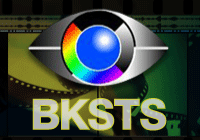
The BKSTS 'Samuelson' Award recognises and rewards the efforts & achievements of companies that have embraced technology or enhanced accessibility to ensure that cinema exhibition is available to all people.

Finalist: The National Lottery Awards recognise the difference that lottery-funded projects have made to local communities. YourLocalCinema beat hundreds of projects, with many thousands of votes, to make the finals. The ceremony was broadcast live, primetime, on BBC1, exposing millions of people to YourLocalCinema's audience development work, and accessible cinema in general.
Nominated: Cinema Marketing Campaign of the Year, 2018 Screen Awards. Run by Screen International, the awards recognise excellence in UK film marketing, publicity and brand partnerships, acknowledging the teams and individuals that contribute to the success of the British film industry.

"SEE the dialogue! HEAR the action! It's the accessible cinema experience!"
Accessible cinema screenings have made a positive, cultural, long-term impact on society. subtitles/captions benefit people of all ages. Each year in the UK, hundreds of children are born with significant hearing loss (NDCS). It's estimated that more than ten million, including thousands of young people, have hearing loss (RNID). Our society is ageing, and with ageing, loss of some hearing is inevitable. Access to film - via captions - is something that we may all appreciate, eventually.
Feedback clearly indicates that opportunities to attend accessible screenings are very much appreciated by many. Click HERE for a selection of positive experiences from film fans who we have helped to discover - or rediscover - the joys of cinema-going.
YourLocalCinema's Twitter feed receives regular 'retweets' from companies/people with a high number of Twitter followers, which helps to publicise accessible cinema far and wide, which leads to many more people visiting the YourLocalCinema website, and signing up for the weekly email/twitter newsletter.
Recent 'retweets': @WarwickADavis (Star Wars actor) “What a brilliant service! Respect to you for taking the time to make cinema accessible to all” (Retweeted to more than 680,000 followers); @cineworld (290,000); @ODEONcinemas (220,000); @BBCFilms (195,000).
Together, email and twitter help YourLocalCinema reach many thousands of film fans each week.
captioned Cinema News
caption glasses, Carers card, New cinemas & more...
Our Valued Sponsors
We simply couldn't exist without them...
Accessible, inclusive subtitled/captioned screenings enable film fans with hearing loss to ENJOY rather than endure cinema. For a few hours, the disabling barrier is removed. They provide sociable benefits such as equality, inclusion and community integration. There were more than a million admissions to accessible screenings in 2019!
